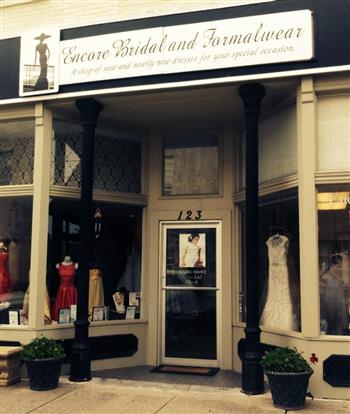
Karen Whitaker is just starting her second career, this time as an entrepreneur. She retired last year after 30 years as a teacher—but Whitaker already had her retirement plans well in order. In 2009, just as the economy was at its worst, she started Encore. After six and a half years in business, this consignment formal wear store is still going strong.
Whitaker’s inspiration came from her own second wedding. Both she and her spouse had never had a big wedding, so they decided to go all out on a formal affair. “But we were in our 40s, and we had to pay for it,” explains Whitaker. “I had to think outside the box.” With a little ingenuity, Whitaker pulled the wedding off for a fraction of what it would usually cost, and her friends started coming to her for advice for their daughters and friends. The need for affordable wedding dresses, as well as bridesmaids’ dresses and prom dresses, gave Whitaker the idea for Encore.
When the economy went south, she decided not to wait until her retirement from teaching, and so her business was born. “People were rethinking how to spend on big-ticket items,” she says. Whitaker’s new business boomed, and within a couple of years it had outgrown her first location on Church Street. She moved the store to its present location on the Square, 123 N. Maple St.
As a consignment business, Whitaker signs a contract with her consignors to keep a dress for nine months. If the dress sells, she splits the profit with the dress’s owner. But if the dress hasn’t sold when the time is up, she asks consignors to pick their dresses up and take them home. Sometimes consignors aren’t interested in having their dresses back. Instead, they ask Whitaker if she can donate the garments to someone in need.
Whitaker did so, giving dresses to charities that provide prom dresses to underprivileged girls, or to theater troupes for costumes. “But it was hard to find anyone that wanted old wedding dresses,” she says. Inspiration came in the form of one of her former students, whose family had worked as missionaries in the island nation of Haiti. Her student came into the store looking for a wedding dress—not for himself, says Whitaker, but for a friend in Haiti for whom he was serving as a “godfather.” This, he told her, is a tradition in Haiti, where young people often can’t raise the funds for traditional wedding items such as a fancy dress. Instead, they ask friends to serve as “wedding godparents” who provide the dress and other items for the wedding.
After her student left, Whitaker thought that it would be great to donate wedding dresses to Haitians—not just for a single wedding, but enough to start a wedding dress rental business. So when another “godparent,” Marlo Wilt, came into her store looking for a dress for a Haitian bride, Whitaker seized the opportunity. She took about a dozen wedding dresses that were waiting to be donated, packed them into a “giant refrigerator box” and sent them to Laurent Wally Jeanty and his bride in Haiti. Jeanty will rent the dresses out for weddings for a small fee. With a little luck, it will help him to provide for his family.
“Haiti has the lowest human development rate in the Americas,” says Whitaker. “For them to have any growth, they’re going to need outside help.” As an educator, it is especially meaningful that her donation, and other similar economic boosts, can help Haitian families keep their children in school. “Most kids start school, but drop out by fifth grade to help support their families,” she says. “It’s a vicious cycle—the way to bring people up is to educate them when they’re young.”
“I want to keep doing this,” says Whitaker. She plans to continue to send donated dresses to Haiti two to three times a year. She plans to add a clause to her contract for new customers allowing them to specify that they’d like their dresses donated to this cause if they don’t sell in the allotted nine months. More than supporting just one family, too, Whitaker is hoping the economic impact of the dresses will continue to grow. “Maybe seamstresses will be able to work, too—it’s the balloon effect,” she says. And every little bit counts.












